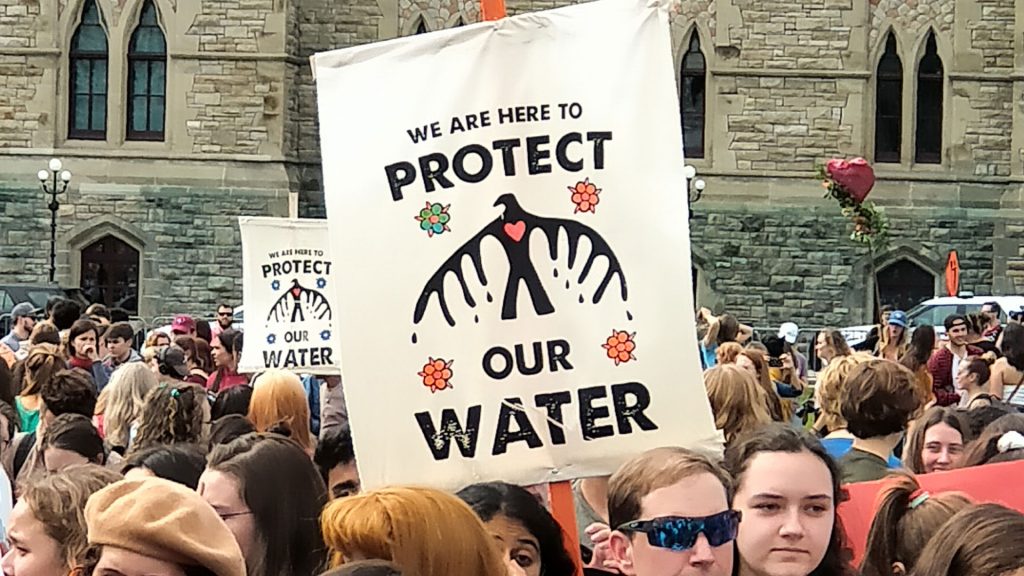
Water laws are the natural laws Indigenous communities have developed and applied for thousands of years to govern the relationship between humans and water,' says Sarah Niman.
The question posted across the screen during both the French and English federal leader’s debates asked: “Water for all Indigenous Peoples?” The question sounds absurd because it is.
Yes, we are still trying to ensure Indigenous Peoples have safe, reliable access to clean drinking water.
The leaders took turns tossing blame, calling the Indigenous water crisis a national shame and promising to do better. Two election cycles ago, the governing party promised to eliminate all boil water advisories in Indigenous communities. The government lifted 108 boil water advisories, but today hundreds of Indigenous communities still do not have reliable access to safe drinking water.
In all the shallow talk about fixing the water crisis, there is little discussion of how the water became unsafe for drinking in the first place. Today’s Indigenous water crisis stems directly from Canada’s refusals to allow Indigenous communities to govern their water relationships and their lands.
The solutions to securing safe drinking water access for all Indigenous Peoples have eluded Parliament for too long. It is time to bring in Indigenous women and water law.
Indigenous women are water-keepers. They carry water in their wombs, they protect the water, and they share water laws with their community. Water laws are the natural laws Indigenous communities have developed and applied for thousands of years to govern the relationship between humans and water.
Canadian laws treat water as a resource and commodity. Indigenous water laws foster healthy relationships between people and water. Water that has been bottled up or piped in from faraway sources disrupts this sacred relationship. Water polluted with toxins harms or sanitized with chemicals disrupts the relationship.
When well-meaning government departments allocate funding to set up water treatment plants, they often impose rules about how to operate the systems. These rules may address infrastructure concerns, but they frequently do not align with Indigenous water laws.
Earlier this year, NWAC lead a research project that brought Indigenous women, Two-Spirit and gender-diverse people from across the country together to discuss the water crisis. Elders imparted water knowledge and shared ways to honour water’s sacredness. Water operators and community advocates discussed the disconnection between water treatment systems the government imposes and the Indigenous water laws their communities practice. Indigenous women shared how their roles as water protectors is often focused on protecting water sources from serious pollutants and harms, but the water flowing from their taps also needs healing solutions.
Indigenous women today are working to revitalize water teachings after generations of colonial policies threatened to stifle these laws. Indigenous women pass water laws through intergenerational teachings and knowledge transmission.
Indigenous women safeguard water laws. Their knowledge can inform how clean water gets into communities from the source. Water laws also explain individual responsibilities to protect water sources and safeguard them for future generations. Bringing Indigenous water laws into the Indigenous water crisis solution is not a “would be nice”, it is an imperative.
Canada’s resource-based water laws disrupt the natural flow of Indigenous water laws. Canada needs to decolonize its approach to water. Water law decolonization shifts the focus beyond reducing the number of boil water advisories in Indigenous communities. Decolonization and reconciliation require supporting Indigenous women and their communities as they work to repair the relationship broken by these harmful colonial laws and policies.
Canada’s laws facilitate solutions that tailor to Canadian legal solutions, not water laws. For example, First Nations communities recently resolved a class-action lawsuit against the government for failing to ensure all Indigenous Peoples have access to clean water. Canada promised $1.5 billion to compensate those deprived of safe drinking water, $6 billion to ensure access to safe drinking water and $400 million to set up a restoration fund to oversee water restoration.
Funding certainly helps Indigenous communities build capacity to heal water at the source and ensure Indigenous people can access safe drinking water. Canada has an obligation in its fiduciary relationship to repair the colonial harms that led to broken water systems in the first place. They also have an obligation to make sure those water systems are repaired, functioning and reliable. Canada must also be willing to help Indigenous women lead their communities to repair their relationships with water.
Indigenous women are up to the task of fulfilling their roles as water protectors. Indigenous women are ready to help everyone secure access to safe, clean water in their homes and buildings. Indigenous women have the knowledge.
The leaders are promising to solve the Indigenous water crisis, but these solutions must involve Indigenous women as leaders in their communities and as water protectors. Any further attempts to resolve the crisis without Indigenous women will perpetuate the news cycle begging such shameful questions as, “water for all Indigenous Peoples?
Sarah Niman is an articling student with the Native Women’s Association of Canada. She recently completed a national research project investigating traditional water knowledge and water operations on reserves.










